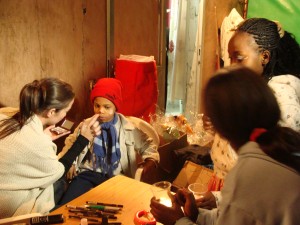 The Jerusalem Post (print edition), March 5, 2010
The Jerusalem Post (print edition), March 5, 2010
On Tuesday night, Africans, Israelis, and internationals marked the opening of a new South Tel Aviv community center with a Purim party, attended by the children of asylum seekers and kids from the neighborhood. Decorations, candy, and other sweets were donated by Hilit Insurance Agency, which specializes in offering its services to the foreign communities in Israel. Volunteers and employees of Mesila Aid and Information Center for the Foreign Community joined the festivities, painting the kids’ faces. The children were also amused with music and balloon animals, amongst other activities and performances.
In many ways, it seemed like the typical children’s Purim party. A rainbow of balloons dotted the walls and sugar-fueled kids dashed about, including more than one crown-wearing princess. A girl costumed as a ladybug buzzed by. A volunteer dabbed color on a little boy’s face, transforming him into a cat. Several girls looked on, chatting with each other and the volunteer in fluent Hebrew.
The community center, located near the Central Bus Station, was founded by the African Workers’ Union in Israel. Members of the 6000-strong organization pooled money together to get the project up and running. Mesila—which is partially funded by the municipality of Tel Aviv—contributed a variety of equipment and computers. And Mesila continues to coordinate with various donors, in hopes of keeping the center’s doors open.
Tamar Shwartz, director of Mesila, praises the new South Tel Aviv center and remarks that the meeting place is opening in the wake of events that “threatened the social network.”
“The community is very much weakened by the activities of the immigration police,” Shwartz says. She is referring to the Oz Unit, the task force charged with clearing the country of illegal residents. Since it began operating in July of 2009, the Oz Unit has arrested and deported hundreds of migrant laborers and refugees. Thousands have left Israel voluntarily. Some observers attribute this to the tense environment created by the presence of the Oz Unit.
Children are especially fearful, Shwartz, a social worker, says. “We see regression, like bed wetting. Some don’t want to leave their houses.” Those who have been born and raised here, Shwartz explains, “don’t have another reality.” The prospect of being forced to return to the country of origin is “very frightening for them.”
Regarding the new community center, Shwartz comments, “Everything that makes this community strong is a blessing.”
Fred Ehioghoe, chairman of the African Workers’ Union in Israel, remarks that the community center will provide a safe space for the children of asylum seekers, in addition to hosting activities for both youth and adults.
Although the center is primarily intended to serve the social needs of African refugees, all neighborhood children will be welcome. And, as the Purim party suggested, the center is also intended to facilitate cultural exchange between African and Israeli children.
In addition to setting up the community center, Ehioghoe says, “[The African Workers’ Union in Israel] is also fighting to legalize the [African] children born in Israel. And quite recently we are fighting for legal status for [refugees] here over five years.”
The comment points to mounting tensions between the foreign community and the government.
The Infiltration Prevention Law, which was recently debated in Knesset and is considered “one of the most dangerous bills ever presented” by some Israeli human rights organizations, will allow for the immediate deportation of anyone who enters Israel illegally. Asylum seekers from Sudan, including Darfur, would be subject to lengthy imprisonment as they are citizens of a state Israel considers an enemy country. And all refugees, children included, will be vulnerable to administrative detention—imprisonment without charges or judicial proceedings.
The bill also includes provisions that human rights organizations say would criminalize their work and that of individuals who assist the refugees.
Tomer Warsha, attorney for the African Workers’ Union in Israel, comments on the bill, “Unfortunately [Israel] can not allow every person who wants to come here to leave African and enter. But at the same time, we can’t forget our commitment and obligation to human rights.”
Regarding both the proposed legislation and the threat to deport children who lack legal status, Warsha remarks, “We expect the government to think about how to take into consideration the basic human rights of everyone.”
Warsha, who also represents the African Refugee Development Center, believes the petition he recently filed on behalf of hundreds of asylum seekers offers a humane solution to the debate. Warsha and his clients have requested the state to grant one-year non-extendable visas to Africans who are residing in Israel illegally. This would forestall deportation, allowing the refugees to immigrate, which is difficult to do without legal status.
In the meantime, the community center meets an important need, Warsha says. “We want them [the asylum seekers] to have a better future—here or elsewhere.”